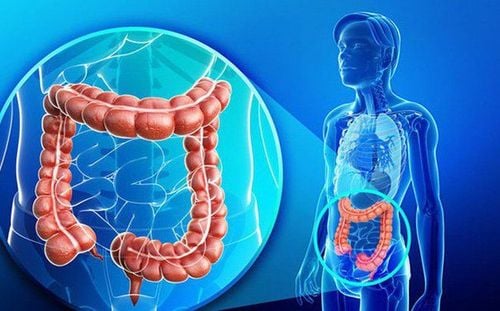This is an automatically translated article.
Baby spitting up when eating is a common phenomenon in young children and infants. If not taken care of in time can lead to many unfortunate consequences, especially increasing the risk of malnutrition. Therefore, finding a way to practice feeding the baby without vomiting is extremely necessary.
1. The reason why the baby spits up when eating
Most babies who are just learning to eat will vomit. The condition that the baby vomits when eating for a long time can be caused by problems with the digestive tract or respiratory tract,... specifically as follows:
Food is not clean, is not of good quality, or is improperly processed, causing children Food poisoning Virus infection causes illness, attacks on the stomach of the child Intestinal infection, digestive system blockage The child has a cold, cough or respiratory infection. However, not always the baby who vomits is referred to as having a disease, but it may also be because the throat and stomach have sensitive reflexes. In addition, there can also be objective reasons such as parents feeding their children and processing foods in the wrong way.
There are a few signs that will warn that your child's health is in trouble, you need to pay attention when you see:
Your baby often vomits yellow, green or bloody fluid The body is pale, breathing Difficulty Vomiting with prolonged cough, slow weight gain. Watch now: Vomiting and how to handle vomiting in children

Tập cho bé ăn giúp tránh tình trạng nôn trớ khi ăn
2. Distinguishing children with difficulty chewing, swallowing and sensitive due to the gag reflex
Some parents, when they see their child vomiting, often think that their child has difficulty swallowing food. But babies who often vomit due to colds or have difficulty chewing/swallowing are completely different:
Children with a sensitive gag reflex will spit up when the food is still in their mouth and has not been chewed, at this time they are trying to swallow. foods. Babies may gag while food is still on the tip, middle, or end of the tongue. If your child has difficulty chewing, he or she may vomit after swallowing food or choke. Because children are just learning to eat, when they encounter large pieces of food, they will not be able to handle them well, leading to vomiting. This condition often occurs in babies who are just starting to eat solids. In addition, children who develop slowly are often slow to chew.
3. How to handle when your baby vomits
If the baby spits up when eating, the mother should prepare a wet towel and bib for the baby to avoid food getting on the child's clothes and body. Parents should clean up for children when vomiting on clothes or body. When a child is vomiting, do not shock, pick up the child will cause the fluid to go back into the lungs, affecting the child's health. When the child vomits, the mother should not get angry or raise her voice to avoid scaring the child. At the same time, the mother should also gently stroke the chest or back in the direction from top to bottom to help the baby comfort and comfort the child to forget the fear of vomiting caused. To prevent the baby from spitting up while nursing, the mother should raise the baby's head higher than the lower body. If the child vomits a large amount, the baby should lie on his side to avoid overflowing into the lungs, quickly wash and change clothes to eliminate odors that make the baby uncomfortable and fussy. After vomiting, parents should not give their children more food but can drink water or milk because the child has just lost a large amount of water. Let your child drink slowly, in small sips to avoid choking. About 12-24 hours after vomiting, the mother should give the child foods that are easy to digest but still have enough nutrients. See now: Can a baby with a lot of vomiting take probiotics?

Nếu bé nôn trớ khi ăn, các mẹ nên chuẩn bị một chiếc khăn ướt và yếm ăn cho bé
4. How to overcome when children vomit
For children with sensitive regurgitation, parents can support their children by:
Limiting rough foods so that the baby's mouth and throat can get used to it, gradually reducing sensitivity. confused with lumpy foods because this is the most annoying thing for children. Your baby will feel scared when he is feeling the smooth food when hard lumps appear, creating surprise and vomiting reflex. To help your baby accept rough foods, experts advise parents to:
Teach your baby to eat rough foods evenly. For example, you can grate some raw sweet potatoes without any lumps, or add a little cookie crumbs. This way can help children get used to rough, less smooth foods, but without surprise and fear. As children get used to it, mothers can increase the quantity and consistency of food. Allow your child to pick up his own food with a spoon if he can. When children eat on their own, they will feel more secure and have fewer accidents. Your baby may be ready to try hard but melt-in-the-mouth foods, like pretzels, for a crunchy, lump-free texture. Practicing brushing teeth is also one of the measures to reduce the sensitive reflexes in children. If your baby likes to hold things in his mouth, then you should choose to buy special mouthpieces for teething babies with a variety of models. At the same time, you should regularly clean and scrub so that your children can play safely. In addition, the mother should also supplement with probiotics, along with the necessary micronutrients: Zinc, selenium, chromium, vitamins B1 and B6, ginger, acerola fruit extract (vitamin C),... to improve the taste. sense, limit vomiting, eat well, reach the correct height and weight, and exceed the standard, have a good immune system, enhance resistance to less sickness and less digestive problems.
Also according to leading nutrition experts, parents need to be calm and persistent when supplementing with nutrients for children, even through eating or functional foods. In particular, the use of functional foods should choose those of natural origin that are easily absorbed, do not allow simultaneous use of many types or continuously change the types of functional foods. Besides, nutritionists also emphasize on the role of biological zinc; Parents should learn and supplement zinc for children properly at the appropriate time, to avoid zinc deficiency affecting the comprehensive development of children.
In short, to improve the state of vomiting when eating, parents should practice feeding their baby rough foods gradually and adjust their eating posture properly. Avoiding the baby spitting up when eating is also helping the child absorb nutrients well and improve the digestive tract.













